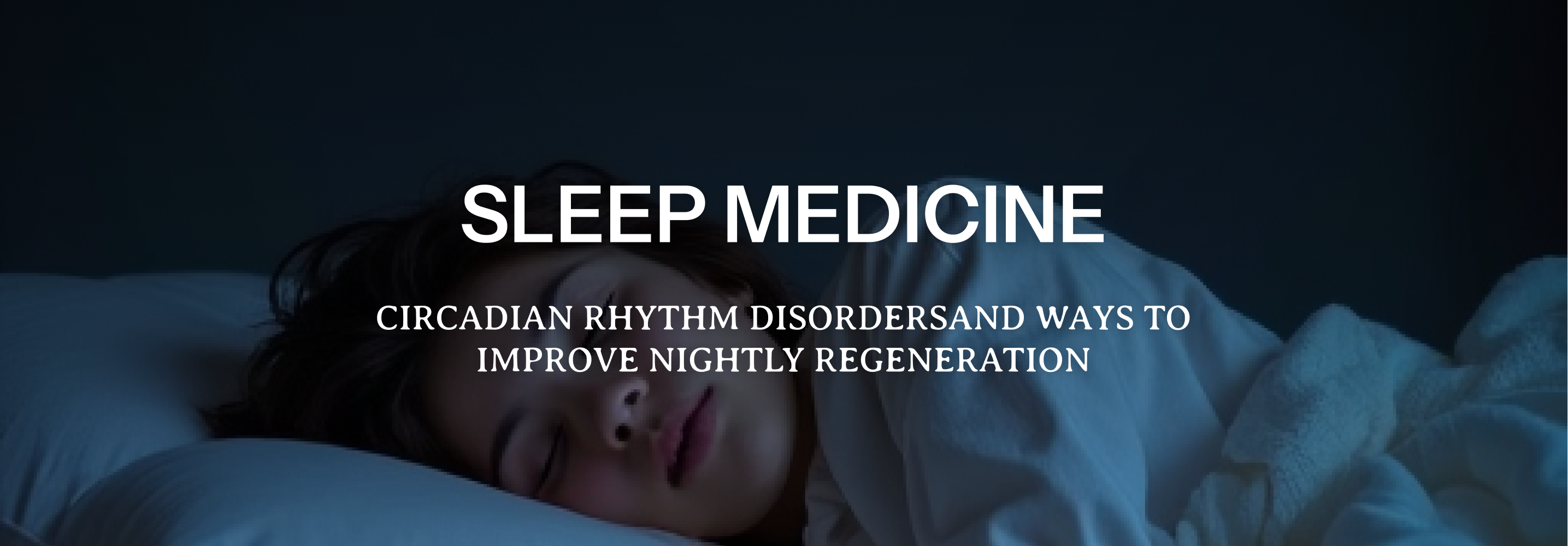
Sleep Medicine - Circadian Rhythm Disorders and Ways to Improve Nighttime Regeneration
Sleep and circadian rhythm disorders
Despite the growing awareness of the role of the right amount and quality of sleep, it is still one of the most neglected and often downplayed areas of health within the circadian rhythms that accompany humans.
It is known that you have to sleep, everyone has to sleep, but most often knowledge about night rest ends with repeated stereotypes, such as the popular: "you need 8 hours of sleep!". The amount of sleep is just one of the parameters. The quality of sleep is influenced by factors such as the number of awakenings at night, the time it takes to fall asleep and many others.
Below, I would like to present the essence of high-quality sleep and its direct (and indirect) impact on the functioning of numerous human physiological processes, as well as suggest some safe and practical habits that can be introduced "right away" to optimize sleep.
"Good" and "Bad" Dream
Recent scientific advances in pathophysiology and neurochemistry have developed many treatment strategies for sleep disorders. Unfortunately, given the still high frequency of their occurrence, I believe it is necessary to build awareness among people about the relationship between "good" and "bad" sleep and other aspects of physical and mental health.
Episodes of gluttony, uncontrolled weight gain, morning headaches, brain fog, low energy levels, lack of contentment and life satisfaction – these are just some of the consequences of poor sleep hygiene and sleep-related disorders.
Disturbances of the circadian rhythm, including sleep disorders, are closely related to the development of depression and parasympathetic dominance (a state of overexertion of the nervous system and disturbances of the balance between the somatic and autonomic systems).
Sleep disorders and brain-derived neurotrophic factor
Disturbed sleep usually means a reduction in the duration of REM or a reduction in the number of REM periods, which in a healthy person should total about 2 hours per day.
The higher the relative length of the REM phase, the better you rest during sleep. A greater share of the REM phase is associated with a lower average heart rate and temperature after waking up. Moreover, the deeper the sleep, the better your physical condition the next day.
INTERESTING FACT: Sex before bed will promote deeper sleep and help inhibit neurodegenerative processes in the brain. It also has a beneficial effect on BDNF (brain-derived neurotropic factor), which plays a key role in the formation of new neurons, and also protects existing neurons, while facilitating the formation of synapses (connections between individual neurons), which is essential in thought processes, learning and higher brain functions.
BDNF is not only important during the process of neurogenesis and neuroplasticity. It also helps protect delicate neural connections from damage (e.g., due to reduced blood flow to the brain, traumas and strong emotional experiences, or environmental toxins).
Proper sleep is important for appropriate changes in hormone levels (e.g. the maximum secretion of growth hormone is noted 90 minutes after falling asleep, and the peak secretion of testosterone in men is between 6:00 and 7:00 AM) . Sleep performs regulatory functions within the sex hormones or cortisol, regulates the HPA hormonal axis, stimulates the lymphatic system and cerebrospinal fluid to metabolize "metabolic waste", regulates the functioning of the hippocampus, is responsible for memory consolidation processes and regulates the level of most neurotransmitters of the nervous system.
We can therefore see that for the proper functioning of the nervous system, thyroid function or proper autoimmune response, quality sleep is simply essential.
Practical support for sleep disorders (apart from advanced clinical entities such as chronic insomnia) can be started by introducing a few appropriate habits.
Naps – necessary or not?
One of the habits may be the use of naps during the day, the so-called "Power nap". They can be successfully introduced in athletes to improve regeneration (in the case of several training sessions during the day, a nap may contribute to a lower feeling of pain associated with exercise or strength training).
World Powerlifting Champion and all-time greatest powerlifter Ed Coan takes naps every day and says it is a key element in his recovery process and his training preparation.
In Dr. Koppen's publications we can read that "in the past, those generals who were able to fall asleep won. Both Alexander the Great and Napoleon were known to nap before battles.
The key to a successful nap is to make sure it lasts between 10 and 30 minutes. The scientific literature confirms these numbers. When someone sleeps more than 30 minutes, they are too groggy to function mentally.
Most importantly, the function of a nap is to achieve more efficient sleep at night, so it should not be a “compensation” for lost sleep, especially when a person had the opportunity to sleep but did not do so (e.g., by not maintaining good night hygiene, using a smartphone/laptop until late).
While they can be beneficial in sports, they should definitely be avoided by people suffering from insomnia (daytime naps can worsen insomnia at night!).
So if you are one of those people whose daytime naps do not help you sleep at night, try using self-relaxation techniques, breathing training or autogenic training instead of napping (it is important that you remain conscious during these activities).
7 Ways to Optimize Your Sleep
It would also be a good idea to introduce so-called "beneficial sleep habits", i.e., to include activities that improve sleep hygiene.
Stimulus control is one of the most effective methods of non-pharmacological support for sleep disorders and increasing its efficiency (average sleep efficiency is the ratio of sleep time to time spent in bed). This is intended to improve the physiological processes regulating sleep and control external and internal stimuli that may disturb sleep.
In practice, these will be habits based on improving the mechanisms of sleep homeostasis and using the natural circadian rhythm:
1. Get up at the same time every day, regardless of what time you went to bed (this will avoid the negative effects of the "social jet lag" phenomenon)
2. Use your bed only for sleeping and sex, avoid doing other things in it
3. Ensure peace, quiet, low temperature and darkness in your bedroom (extreme temperatures disturb sleep)
4. Exercise regularly and be physically active (but preferably no later than 2 hours before falling asleep)
5. Do not check your phone notifications/clock at night (this can cause unnecessary fear of insomnia)
6. If silence makes you anxious, try to set calm music below your hearing threshold (which allows you to recognize words), this will allow your thoughts to flow more freely and calm down before going to sleep
7. Go to bed only when you are sleepy (if you do not fall asleep within 20 minutes, get out of bed, go to another room and do something relaxing, go back to bed when you feel sleepy again) feel sleepy, repeat the above items until you fall asleep).
You can also try sleep supplements from Solve Labs, which can help increase your total sleep time, including NREM sleep.







